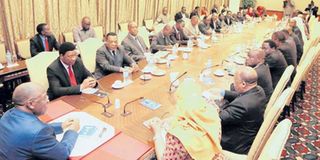The long walk to an open govt (1)

President John Magufuli during a meeting with members of his cabinet early last year. All eyes are on the fifth phase administration to see whether or not it will continue pushing the open government process, an initiative that won former President Jakaya Kikwete praise locally and abroad. PHOTO | FILE
What you need to know:
- Generally, GI’s report has concluded that the majority of government leaders, civil servants, and CSOs do not support the Open Government Partnership (OGP). But before going into details about the report on OGP, let us have a shared understanding of what it means.
The findings of a study by Global Integrity (GI) about efforts of promoting accountable, open and responsive government in Tanzania have moved me to write this three-part series.
Generally, GI’s report has concluded that the majority of government leaders, civil servants, and CSOs do not support the Open Government Partnership (OGP). But before going into details about the report on OGP, let us have a shared understanding of what it means.
At the end, I shall link the OGP initiatives with efforts by incumbent President John Magufuli to restore the ownership of Tanzanian resources and reviewing the contracts that the previous governments entered with investors.
What is OGP?
So far we don’t have a clear single definition of open government that is accepted globally, but the definition by Global Integrity, widely accepted as a common definition of open government, refers to the “the transparency of government actions, the accessibility of government services and information, and the responsiveness of government to new ideas, demands and needs”.
It is a multilateral initiative that was formed for the purpose of creating stable and clear commitments from national and subnational governments to promote transparency, empower citizens, fight corruption, and provide new technologies to strengthen governance.
OGP was launched on 20th September 2011 on the sidelines of the UN General Assembly. There were eight founding members, including Brazil, Indonesia, Mexico, Norway, Philippines, South Africa, UK and US. It currently has more 70 participating member countries. The book titled Open Government Collaboration, Transparency, and Participation in Practice stipulates that open government is “the notion that people have the right to access the documents and proceedings of government”. Citizens should be able to give their views about issues that directly touch their lives and they should be given an opportunity to participate in decision-making and hold accountable those who will be executing decisions that they were involved in.
Background in Tanzania
In the report titled Opening Government? The Case of Tanzania in the Open Government Partnership, GI provides a historical background of OGP in Tanzania. The report highlights that in 2011 there was a milestone achievement whereby the government joined the Open Government Partnership (OGP) with high hopes to make Government business more open to its citizens.
However, the report says that the open government agenda in Tanzania needs to be understood in connection with the political and economic reforms that began in the mid-1980s. The reforms were preceded by the arrival of President Ali Hassan Mwinyi in 1985.
The re-introduction of multiparty democracy in 1992 increased civic space by allowing the creation of civil society organisations (CSOs) that started to negotiate for space in the policy arena. It is very natural for traditionalists within the state to resist the inclusion of civil society in government’s duties for they consider that move as an “encroachment” on public policy processes. However, there were situations where state–civil society cooperation was smooth.
The CSOs’ success in promoting their agenda to the government became contingent on the nature of the relationship between civil society and state actors, and also flowed from the role they played in providing some public services alongside the state.
“In support of open government, donors have also channelled funds to major CSOs, which then promote transparency and advocate for open government initiatives. As will be argued in the following sections, Twaweza, for example, which is the most active member of the national OGP Steering Committee”, they say.
Before the Tanzanian government joined OGP, it participated in various other multi-stakeholder policy dialogue platforms, such as the Annual Policy Dialogue (2009) and the 1998 Public Expenditure Review. The GI report shows that those dialogues involved the government, CSOs, the private sector and development partners and in addition, several government ministries, departments and agencies (MDAs).
The MDAs introduced websites and other information, communication, and technology systems to increase public access to government information and improve service delivery.
Mr Rakesh Rajani, a leading civil society figure, played a key role in encouraging the government to join the OGP initiative. He was among the founding members of OGP’s global Steering Committee who later become a civil society co-chair of the partnership. His efforts to talk to the former President Kikwete bore fruit, for the latter accepted the idea of joining the OGP.
As a result, Tanzania joined the OGP, forming a steering committee composed of government and civil society representatives. The committee was assigned the major role of coordinating National Action Plans and of monitoring their implementation. Also, the government, and the steering committee, made 25 commitments in its first OGP National Action Plan (2012–2013). Twaweza was very much involved in the details of choosing priorities for committee, but as other CSOs had feared, neither Twaweza nor other representatives of civil society were substantially involved in the final selection or implementation of specific commitments.
As a result, the Independent Reporting Mechanism, which assesses the implementation of OGP commitments, found that commitments on the first action plan were too ambitious, and that few of the selected commitments were successfully implemented.
This was evident from the beginning because underneath there was latent pressure from donors, which pushed the Tanzanian government into setting unworkable targets. Most of the commitments that were adopted mirrored those from countries such as Brazil and South Africa, which already had well developed state-CSO relations and mechanisms in place to support such inititiaves.
It is also said that the government was unhappy with assessment of the first OGP Independent Reporting Mechanism because the review failed to reflect the contextual realities of the time (i.e insufficient funds, the time required to institutionalise changes, and agreed areas of focus, which were education, water and health).
Also the government felt that it was unfairly assessed on all three pillars (transparency, participation and accountability) of the process, particularly as some commitments hinged on the reciprocity of donors, for example commitments on allocation of grants to local government authorities and budget execution reports and on donor funding.
In response, the government proactively recruited more actors to join the second committee in 2014. The intention was to improve the effectiveness of the committee, and support the implementation of commitments.
The ministries of Land, Housing and Human Settlement and of Minerals and Energy were added to the steering committee. The study says that their participation was sensible due to the burgeoning investment in land and extractive activities in Tanzania. The rationale to add these two ministries was based on complaints to them related to inadequate public service delivery and the image that perceived they embraced corruption. Two new CSOs were also included; namely, the Tanganyika Law Society and Foundation for Civil Societies.
However, despite the expansion, little changed – government institutions and CSOs involved in OGP failed to cooperate, and each side made accusations towards the other. Because of this distrust and unequal power dynamics, both within civil society and between civil society and government, equitable cooperation was often lacking.
In the next article, we need to know whether the idea, a personal initiative of Mr Kikwete, can be taken forward by the incumbent President John Magufuli who has shown a great determination to expunge his regime from corruption practices.
Faraja Kristomus is an assistant lecturer at University of Dar es Salaam; Email: [email protected]




